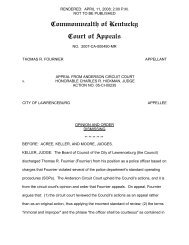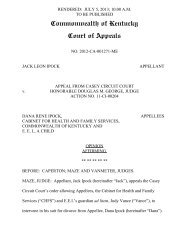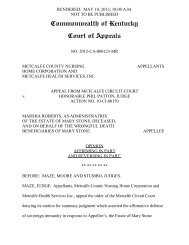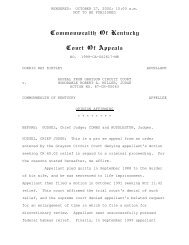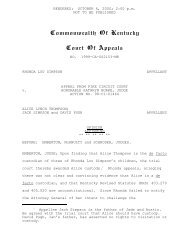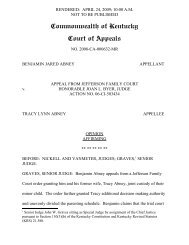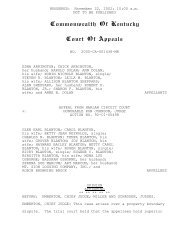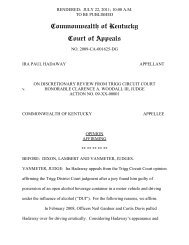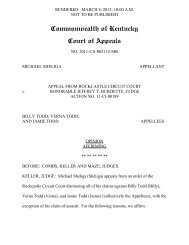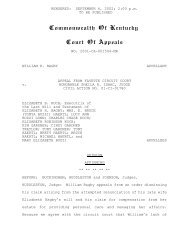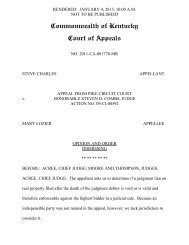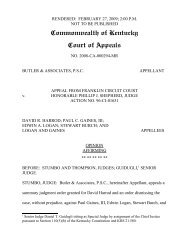Commonwealth of Kentucky Court of Appeals - Justia
Commonwealth of Kentucky Court of Appeals - Justia
Commonwealth of Kentucky Court of Appeals - Justia
Create successful ePaper yourself
Turn your PDF publications into a flip-book with our unique Google optimized e-Paper software.
RENDERED: MARCH 18, 2011; 10:00 A.M.<br />
TO BE PUBLISHED<br />
<strong>Commonwealth</strong> <strong>of</strong> <strong>Kentucky</strong><br />
<strong>Court</strong> <strong>of</strong> <strong>Appeals</strong><br />
NO. 2009-CA-000716-MR<br />
WILLIAM EASLEY APPELLANT<br />
APPEAL FROM GRAVES CIRCUIT COURT<br />
v. HONORABLE TIMOTHY C. STARK, JUDGE<br />
ACTION NO. 07-CR-00172<br />
COMMONWEALTH OF KENTUCKY APPELLEE<br />
OPINION<br />
AFFIRMING<br />
** ** ** ** **<br />
BEFORE: ACREE, LAMBERT, AND THOMPSON, JUDGES.<br />
LAMBERT, JUDGE: William Easley appeals from the judgment <strong>of</strong> the Graves<br />
Circuit <strong>Court</strong> convicting him <strong>of</strong> eighteen counts <strong>of</strong> knowingly exploiting an adult<br />
(over $300.00) and two counts <strong>of</strong> knowingly exploiting an adult (under $300.00)<br />
and sentencing him to a total <strong>of</strong> ten years’ imprisonment. After careful review, we<br />
affirm the judgment.
In June 2007, Easley was indicted by the Graves County Grand Jury<br />
and charged with eighteen counts <strong>of</strong> felony exploitation <strong>of</strong> an adult pursuant to<br />
<strong>Kentucky</strong> Revised Statutes (KRS) 209.990 in connection with the handling <strong>of</strong> his<br />
mother’s and aunt’s financial affairs while acting as attorney-in-fact under their<br />
powers <strong>of</strong> attorney (POA). Easley was also charged with two counts <strong>of</strong><br />
misdemeanor exploitation <strong>of</strong> an adult in connection with the handling <strong>of</strong> his aunt’s<br />
affairs. The charges stemmed from transactions that occurred from March 2006<br />
through March 2007.<br />
Easley’s trial began on January 20, 2009, and ended the following<br />
day. According to the <strong>Commonwealth</strong>’s pro<strong>of</strong>, Easley took over as attorney-in-<br />
fact for his mother, Ruth Easley, in July 2005. By then, Ruth Easley was living in<br />
a nursing home. In November 2006, the Cabinet for Health and Family Services<br />
(Cabinet) was asked to investigate the possible financial exploitation <strong>of</strong> Ruth<br />
Easley. Sandra Halter, a representative from the Cabinet, spoke with Ruth Easley<br />
about her concerns.<br />
When Ms. Halter spoke with Easley, he denied misusing his mother’s<br />
money. As part <strong>of</strong> her investigation, Ms. Halter obtained the financial records for<br />
Ruth Easley’s accounts. From these records, she created a spreadsheet <strong>of</strong><br />
transactions for the accounts beginning in July 2005, when Easley took over as<br />
attorney-in-fact under POA, through March 2007.<br />
Using her spreadsheet, Ms. Halter testified that from September 15,<br />
2005, through December 12, 2005, Easley wrote $16,630.00 in checks to himself<br />
-2-
from his mother’s checking account. Similarly, from December 12, 2005, through<br />
June 19, 2006, Easley wrote $43,500.00 in checks to himself; from June 29, 2006,<br />
through December 28, 2006, he wrote $18,405.00 in checks to himself; and from<br />
January 2007 through March 2007, he wrote $3,769.00 in checks to himself. Thus,<br />
from the period <strong>of</strong> September 2005 through March 2007, Easley wrote a total <strong>of</strong><br />
$82,304.00 in checks to himself from his mother’s account. The memo lines <strong>of</strong><br />
many <strong>of</strong> the checks Easley wrote to himself were left blank.<br />
The evidence indicated that there was sufficient money to pay Ruth<br />
Easley’s bills when Easley took over as attorney-in-fact in the middle <strong>of</strong> 2005.<br />
Each month, approximately $5,000.00 was deposited into Ruth Easley’s accounts<br />
from social security, a teacher’s pension, and a separate investment account.<br />
Additionally a lump sum <strong>of</strong> about $66,000.00 had previously been deposited into<br />
her account as a result <strong>of</strong> a condemnation proceeding. However, Easley stopped<br />
paying his mother’s nursing home bills, and several checks were returned due to<br />
insufficient funds. Ms. Halter testified that Easley failed to pay about $20,000.00<br />
<strong>of</strong> his mother’s bills, including $14,000.00 to his mother’s nursing home;<br />
approximately $1,000.00 to a drug store; and about $2,900.00 to a local attorney.<br />
When Easley ceased acting as his mother’s attorney-in-fact in March 2007, Ruth<br />
Easley’s other son took control and paid his mother’s bills from his own funds.<br />
While acting as attorney-in-fact for his aunt, Virginia Easley, Easley<br />
wrote checks to himself from her account and took money from her account via<br />
ATM transactions. Easley also failed to pay his aunt’s bills as well.<br />
-3-
Despite knowing that his handling <strong>of</strong> his mother’s and aunt’s financial<br />
affairs was being investigated by the Cabinet, Easley did not respond to calls or a<br />
letter from Ms. Halter. Easley never provided any documents to Ms. Halter or<br />
police indicating the money he took from the accounts was spent for his mother’s<br />
and aunt’s benefits.<br />
In his defense, Easley testified that he wrote the checks at issue and<br />
that those checks were written to reimburse him for expenses incurred in taking<br />
care <strong>of</strong> his mother’s farm and his aunt’s financial affairs. He testified that both his<br />
mother and his aunt told him to pay his expenses from their monies.<br />
Prior to the trial, on January 5, 2009, Easley asked the trial judge to<br />
suppress the bank records obtained by the Cabinet. The <strong>Commonwealth</strong><br />
responded, and on January 12, 2009, a brief hearing was held regarding Easley’s<br />
motion. The <strong>Commonwealth</strong> presented testimony from Ms. Halter regarding her<br />
investigation and her legal authority under KRS 209.030(7) for obtaining Ruth<br />
Easley’s bank records. Easley <strong>of</strong>fered testimony regarding his alleged interest in<br />
his mother’s accounts. At the conclusion <strong>of</strong> that hearing, the trial judge denied<br />
Easley’s motion to suppress the bank records, and this ruling was memorialized in<br />
an order entered January 15, 2009.<br />
Also pertinent to this appeal is Easley’s history <strong>of</strong> refusing to<br />
cooperate with his defense counsel by providing records which may or may not<br />
have refuted the allegations detailed in the indictments. On October 9, 2007,<br />
Attorney Dennis Null filed a motion to withdraw as Easley’s counsel on the<br />
-4-
grounds that “Defendant and counsel are unable to maintain an attorney-client<br />
relationship, which will permit counsel to properly and adequately represent the<br />
Defendant.” On the record, Attorney Null explained that he had been going back<br />
and forth with Easley for several months regarding witnesses, his client’s failure to<br />
keep him informed <strong>of</strong> what was going on, and his inability to provide documents<br />
and other evidence that would support his defense. The trial court permitted<br />
Attorney Null to withdraw, and Easley then hired new counsel, Attorney Benjamin<br />
Look<strong>of</strong>sky.<br />
On April 28, 2008, the trial judge set a trial date <strong>of</strong> November 18,<br />
2008, giving the parties about seven months to prepare. When the November trial<br />
date arrived, however, defense counsel asked for a continuance the morning <strong>of</strong> the<br />
trial because he was not prepared to proceed. Attorney Look<strong>of</strong>sky stated that he<br />
had had trouble communicating with Easley— Easley indeed arrived late for trial<br />
—and Easley had failed to provide certain documents allegedly pertinent to his<br />
defense. In response, the prosecutor indicated that he felt as if he were being<br />
blind-sided, and defense attorney Look<strong>of</strong>sky agreed and noted that he understood<br />
the prosecutor’s sentiments.<br />
At the conclusion <strong>of</strong> this discussion, the trial court agreed to continue<br />
the trial until January 20, 2009. As for the documents at issue, the prosecutor<br />
asked that they be produced to him no later than January 1, 2009, and the trial<br />
court included that requirement in his continuance order, with the parties to meet<br />
on January 12, 2009, to discuss. Notwithstanding the trial court’s verbal<br />
-5-
directives, the court entered an order directing Easley to produce the documents by<br />
January 12, 2009, when the parties were to appear in court. The order expressly<br />
required Easley to be present in court on the 12 th <strong>of</strong> January.<br />
On January 12, 2009, when the attorneys appeared in court for review<br />
<strong>of</strong> the documents and to address Easley’s motion to suppress, Easley was not<br />
present. Video records show Easley arriving later that afternoon with a box.<br />
Again the prosecutor complained that he had not received any documents from the<br />
defense, and again Attorney Look<strong>of</strong>sky candidly explained that his client was not<br />
cooperating and was not providing any documents. The trial court then warned<br />
Easley that if the prosecutor did not have the documents by the close <strong>of</strong> business<br />
that day, they would be excluded at trial. The trial court informed Easley that if he<br />
appeared late to court again, he would be held in contempt and put in jail.<br />
Notwithstanding these events, on the morning <strong>of</strong> the trial, Easley<br />
again asked for yet another continuance and complained that his defense counsel<br />
was not prepared for trial. This request was denied. When the document issue was<br />
addressed, the prosecutor handed the trial court a small stack <strong>of</strong> documents he<br />
received on Friday, January 16, 2009, explaining that the documents contained<br />
alleged substantiation <strong>of</strong> less than $2,000.00 Easley had taken from his mother.<br />
The trial judge held that while the prosecutor was likely entitled to have his motion<br />
to suppress granted in toto, he would allow the documents delivered to the<br />
prosecutor on January 16, 2009, to be admitted at trial but would exclude<br />
documents delivered after that date.<br />
-6-
At the close <strong>of</strong> the pro<strong>of</strong>, the jury found Easley guilty on all charges<br />
and recommended a sentence <strong>of</strong> ten years’ imprisonment. This appeal now<br />
follows.<br />
As his first assignment <strong>of</strong> error on appeal, Easley argues that the trial<br />
court erred by not granting his motion to suppress the Cabinet’s review <strong>of</strong> his<br />
mother’s bank records without legal process. In support <strong>of</strong> this argument, Easley<br />
contends he had an ownership interest in the bank account, and the bank should<br />
never have turned over the records without some sort <strong>of</strong> legal process.<br />
When seeking to suppress evidence, a defendant must first<br />
demonstrate he had a reasonable expectation <strong>of</strong> privacy in the property searched.<br />
Foley v. <strong>Commonwealth</strong>, 953 S.W.2d 924, 934 (Ky. 1997). The factual findings <strong>of</strong><br />
the trial court in regard to a suppression motion are conclusive if supported by<br />
substantial evidence. <strong>Kentucky</strong> Rules <strong>of</strong> Criminal Procedure (RCr) 9.78.<br />
In LaFollette v. <strong>Commonwealth</strong>, 915 S.W.2d 747, 749 (Ky. 1996), the<br />
<strong>Kentucky</strong> Supreme <strong>Court</strong> noted an expectation <strong>of</strong> privacy is reasonable only where<br />
the individual manifests a subjective expectation <strong>of</strong> privacy in the object <strong>of</strong> the<br />
challenged search and society is willing to recognize the subjective expectation as<br />
reasonable. The United States Supreme <strong>Court</strong> has repeatedly recognized that what<br />
one exposes to the public or discloses to third parties is not subject to Fourth<br />
Amendment protection. E.g., Smith v. Maryland, 442 U.S. 735, 743-44, 99 S.Ct.<br />
2577, 61 L.Ed.2d 220 (1979). As such, courts have recognized that persons have<br />
no expectation <strong>of</strong> privacy in such things as phone numbers they dial, rolls <strong>of</strong> film<br />
-7-
given to third parties for processing, and information disclosed to their Internet<br />
service providers. Id.<br />
As for Easley’s specific claim regarding his mother’s bank account<br />
records, the nation’s highest court has recognized an individual has no reasonable<br />
expectation <strong>of</strong> privacy in his/her bank records:<br />
Even if we direct our attention to the original<br />
checks and deposit slips, rather than to the micr<strong>of</strong>ilm<br />
copies actually viewed and obtained by means <strong>of</strong> the<br />
subpoena, we perceive no legitimate “expectation <strong>of</strong><br />
privacy” in their contents. The checks are not<br />
confidential communications but negotiable instruments<br />
to be used in commercial transactions. All <strong>of</strong> the<br />
documents obtained, including financial statements and<br />
deposit slips, contain only information voluntarily<br />
conveyed to the banks and exposed to their employees in<br />
the ordinary course <strong>of</strong> business. . . .<br />
The depositor takes the risk, in revealing his affairs<br />
to another, that the information will be conveyed by that<br />
person . . . .<br />
United States v. Miller, 425 U.S. 435, 442-43, 96 S.Ct. 1619, 48 L.Ed.2d 71<br />
(1976); Williams, M.D. v. <strong>Commonwealth</strong>, 213 S.W.3d 671 (Ky. 2007) (citing<br />
Miller). Indeed, the high court recognized an individual “can assert neither<br />
ownership nor possession” in the records because these records “are the business<br />
records <strong>of</strong> the banks.” Miller, 425 U.S. at 440. Thus Easley’s mother’s bank<br />
records were not subject to the protections <strong>of</strong> the Fourth Amendment or Section 10<br />
<strong>of</strong> the <strong>Kentucky</strong> Constitution, and Easley’s claims fail as a matter <strong>of</strong> law. The trial<br />
court properly denied Easley’s motion to suppress.<br />
-8-
For his second claim <strong>of</strong> error, Easley contends the trial court erred by not<br />
permitting him to “put on evidence <strong>of</strong> the use <strong>of</strong> [his] mother’s money.” Easley<br />
argues that the trial court should not have excluded certain documents from being<br />
introduced and admitted at trial.<br />
<strong>Kentucky</strong> Rules <strong>of</strong> Criminal Procedure (RCr) 7.24(9) permits a trial judge to<br />
exclude from evidence documents not turned over in discovery as required by<br />
court order. We review the trial court’s decision for abuse <strong>of</strong> discretion. Penman<br />
v. <strong>Commonwealth</strong>, 194 S.W.3d 237, 249 (Ky. 2006) (overruled on other grounds<br />
by Rose v. <strong>Commonwealth</strong>, 322 S.W.3d 76 (Ky. 2010)). In light <strong>of</strong> Easley’s<br />
ongoing failure to cooperate with his defense counsel, his refusal to produce<br />
documents, and his disregard for the trial court’s discovery order to have the<br />
documents to the prosecutor by January 12, 2009, we cannot say that the trial court<br />
abused its discretion by excluding the documents at issue. Easley had ample time<br />
to produce these documents, and he did not. The trial court granted Easley a<br />
continuance and was more than fair in working with Easley, but Easley simply<br />
failed to take the chances given to him. Further, the trial court did not exclude all<br />
the documents Easley wanted to introduce, and nothing in the court’s orders<br />
prevented Easley from simply telling the jury how he spent his mother’s money.<br />
Accordingly, the trial court did not err in excluding the documents from evidence,<br />
and its ruling was not an abuse <strong>of</strong> discretion.<br />
For his third claim <strong>of</strong> error on appeal, Easley contends that the trial court<br />
erred by permitting the <strong>Commonwealth</strong> to present evidence <strong>of</strong> checks he wrote to<br />
-9-
himself from his mother’s account in 2005; i.e., outside the March 2006 to March<br />
2007 period set forth in the indictment.<br />
The <strong>Commonwealth</strong> presented pro<strong>of</strong> at trial that Easley took over as<br />
attorney-in-fact under his mother’s POA on July 26, 2005, and from September 15,<br />
2005, through December 12, 2005, bank records showed Easley wrote $16,630.00<br />
in checks to himself. As described previously, from December 12, 2005, through<br />
June 19, 2006, Easley wrote $43,500 in checks; from June 29, 2006, through<br />
December 28, 2006, he wrote $18,405.00 in checks; from January 2007 through<br />
March 2007 he wrote $3,769.00 in checks; and from September 2005 through<br />
March 2007, Easley wrote a total <strong>of</strong> $82,304.00 in checks from his mother’s<br />
accounts to himself.<br />
Under <strong>Kentucky</strong> Rules <strong>of</strong> Evidence (KRE) 404(b), evidence <strong>of</strong> “other<br />
crimes, wrongs, or acts is not admissible to prove the character <strong>of</strong> a person in order<br />
to show action in conformity therewith[,]” but such evidence is admissible if<br />
“<strong>of</strong>fered for some other purpose, such as pro<strong>of</strong> <strong>of</strong> motive, opportunity, intent,<br />
preparation, plan, knowledge, identity, or absence <strong>of</strong> mistake or accident[.]” KRE<br />
404(b)(1). KRE 404(b)(2) provides another exception if the evidence is<br />
“inextricably intertwined with other evidence essential to the case[.]”<br />
In Bell v. <strong>Commonwealth</strong>, 875 S.W.2d 882, 889 (Ky. 1994), the <strong>Kentucky</strong><br />
Supreme <strong>Court</strong> adopted a three-part test for determining the admissibility <strong>of</strong> other<br />
crimes evidence under KRE 404(b). Under Bell, the first inquiry is whether the<br />
proposed evidence is “relevant for some purpose other than to prove the criminal<br />
-10-
disposition <strong>of</strong> the accused.” Id. The term “relevant evidence” is defined as<br />
“evidence having any tendency to make the existence <strong>of</strong> any fact that is <strong>of</strong><br />
consequence to the determination <strong>of</strong> the action more probable or less probable than<br />
it would be without the evidence.” KRE 401.<br />
In the instant case, the 2005 checks and evidence were relevant to show that<br />
Easley’s plan was to take his mother’s money soon after he took over as attorney-<br />
in-fact in July 2005. The fact that he began writing checks to himself in 2005 also<br />
shows that the checks he wrote during the indictment period were not a mistake, an<br />
accident, or simply the result <strong>of</strong> poor bookkeeping.<br />
The second Bell inquiry is whether the evidence <strong>of</strong> the bad act is<br />
“sufficiently probative <strong>of</strong> its commission by the accused to warrant its introduction<br />
into evidence.” Id. at 890. Here, there is no question that the evidence regarding<br />
the 2005 checks is probative <strong>of</strong> whether Easley committed the acts at issue in the<br />
indictment.<br />
The third and final Bell inquiry is whether “the potential for prejudice from<br />
the use <strong>of</strong> other crimes evidence substantially outweigh[s] its probative value.” Id.<br />
In his brief, Easley argues the jury’s verdict is suspect because it is impossible to<br />
tell if the jury convicted and sentenced him based on the 2005 checks he wrote to<br />
himself or because it believed that he committed the crimes charged. Juries are<br />
composed <strong>of</strong> reasonable persons who are not easily confused. See Scobee v.<br />
Donahue, 291 Ky. 374, 164 S.W.2d 947, 949 (1942) (“It is to be assumed that the<br />
jury was composed <strong>of</strong> sensible and reasonable men and to be presumed that they<br />
-11-
understood and followed the evidence and instructions in their entirety.”). The<br />
pro<strong>of</strong> in the instant case was not complex, and there is no reason to believe the jury<br />
became confused between checks written in 2005 and checks written during the<br />
indictment period.<br />
Finally, Easley argues that the trial court abused its discretion by denying his<br />
second request to continue the trial. A trial judge may postpone a trial upon a<br />
showing <strong>of</strong> sufficient cause. RCr 9.04; Snodgrass v. <strong>Commonwealth</strong>, 814 S.W.2d<br />
579, 581 (Ky. 1991) (overruled on other grounds by Lawson v. <strong>Commonwealth</strong>, 53<br />
S.W.3d 534 (Ky. 2001)). The decision to delay a trial rests solely in the discretion<br />
<strong>of</strong> the trial judge, and whether a continuance is appropriate depends on the “unique<br />
facts and circumstances <strong>of</strong> that case.” Snodgrass at 581.<br />
Factors the trial court is to consider in exercising its<br />
discretion are: length <strong>of</strong> delay; previous continuances;<br />
inconvenience to litigants, witnesses, counsel and the<br />
court; whether the delay is purposeful or is caused by the<br />
accused; availability <strong>of</strong> other competent counsel;<br />
complexity <strong>of</strong> the case; and whether denying the<br />
continuance will lead to identifiable prejudice.<br />
Id. (internal citation omitted). Finally, a reviewing court will not disturb such a<br />
decision unless it is clearly demonstrated to be an abuse. Toler v. <strong>Commonwealth</strong>,<br />
295 Ky. 105, 173 S.W.2d 822 (1943).<br />
Weighing the Snodgrass factors, it is clear the trial court did not abuse its<br />
discretion in denying what amounted to Easley’s second last-minute attempt to<br />
delay his trial. The first factor, length <strong>of</strong> the delay, did not weigh in Easley’s<br />
favor. He was indicted in mid-2007 and was given notice seven months in advance<br />
-12-
as to when the first trial would occur. He was given a two-month continuance in<br />
November, and when the second trial date arrived he requested an additional<br />
ninety-day continuance. Easley’s proposed continuance would have continued the<br />
trial to a date almost two years after he was indicted. For a case with an<br />
uncomplicated set <strong>of</strong> facts, this length <strong>of</strong> time seems quite excessive.<br />
Regarding the second factor, Easley had already been granted previous<br />
continuances and demonstrated that he was not cooperating with his original<br />
attorney or his second defense counsel. Furthermore, another continuance would<br />
have caused an inconvenience to the <strong>Commonwealth</strong>, not to mention to the<br />
victims’ families. Easley’s delays appeared to be purposeful and caused by Easley<br />
himself, which weighs against Easley. Easley does not make any argument about<br />
the fifth factor, the availability <strong>of</strong> competent counsel, and thus we will not address<br />
it now.<br />
The sixth factor, complexity <strong>of</strong> the case, weighs against Easley as well. The<br />
<strong>Commonwealth</strong> presented its case via six witnesses in less than four hours. The<br />
defense presented its case in about one hour through one witness. The concepts at<br />
issue were not difficult and neither was the pro<strong>of</strong>. The final factor, identifiable<br />
prejudice, does not weigh in Easley’s favor either. In his brief, Easley simply<br />
argues that the “defense was prejudiced by not being allowed to fully defend<br />
Easley.” We disagree. There is no pro<strong>of</strong> in the record that Easley was in any way<br />
prejudiced by the trial court’s refusal to grant another continuance, and any lack <strong>of</strong><br />
-13-
a defense was due to nothing other than his lack <strong>of</strong> cooperation with not one, but<br />
two defense attorneys.<br />
Because we have been presented with no reversible error, the judgment <strong>of</strong><br />
the Graves Circuit <strong>Court</strong> is hereby affirmed.<br />
ALL CONCUR.<br />
BRIEF FOR APPELLANT:<br />
Karen Shuff Maurer<br />
Assistant Public Advocate<br />
Frankfort, <strong>Kentucky</strong><br />
BRIEF FOR APPELLEE:<br />
Jack Conway<br />
Attorney General <strong>of</strong> <strong>Kentucky</strong><br />
Jeffrey A. Cross<br />
Assistant Attorney General<br />
Frankfort, <strong>Kentucky</strong><br />
-14-



